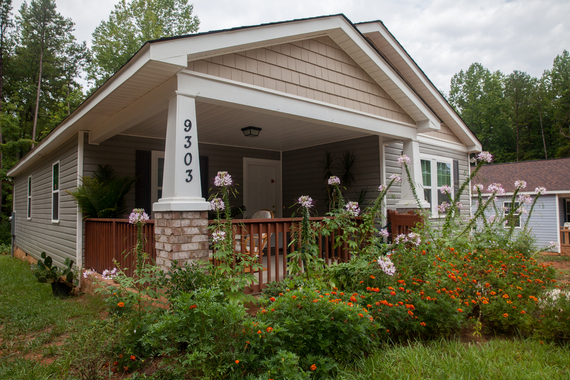I was raised to believe I could rise. I think many of us were.
Our parents taught us, in ways large and small, that what mattered most was not where we started out but where we were headed. It was passed down as promise that no matter who we were or where we came from, we all deserve to have a decent life, to know that we have the power to take care of ourselves and our families, to build our own futures.
We believed it because so many of us were living it.
The eldest of five children, growing up in a solid middle class household in San Antonio, Texas, I never doubted that the doors of opportunity were indeed open to me. And I saw how hard -- and successfully -- my parents worked to make it so.
But this is sadly not the case for an ever-growing number of families, as we struggle societally with the impact of inequality and injustice. What our children seem to see most these days are their parents working harder but still somehow struggling more. Our cities, our neighborhoods, our housing so often trap us, offering only the most dimly lit paths to the opportunity and self-improvement that so many of us need.
It's staggering to realize that there is virtually no location in the U.S. where a full-time minimum wage employee can afford even a one-bedroom apartment. How can our cities be places of strength and stability when our workers can't afford to live in them? How can our neighborhoods remain places of rich diversity and experience?
I have always believed that decent, affordable housing is crucial to creating economic mobility for families and to keeping our cities and towns vital engines of progress, and I've spent most of my working life championing innovations that strengthen efforts to make this fundamental building block of success accessible to all.
It's why I'm so proud to support the mission of an organization like Habitat for Humanity, which just recently topped the Builder 100 annual list of private homebuilders in the country. Habitat also was recently named "Brand of the Year" in the social services nonprofit category based on the 2016 Harris Poll EquiTrend® Study. This is the second year in a row Habitat has received this recognition. This year, it was also the highest ranked brand in "Trust" and "Love" in that same nonprofit category.
I think it's worth examining why an undertaking like Habitat works so well and resonates with so many.
1. Basic need. Habitat's work is focused on an identifiable and recognized need: partnering with families who are in need of decent shelter to build and improve places they can call home. We all agree that there is a dire need; Habitat's response is tangible, visible and measurable. 2. Earned benefits. Habitat homeowners earn their way toward a home, performing sweat equity to help build their houses alongside volunteers and paying an affordable mortgage. People recognize how uplifting this process is for all involved, and the fairness at the heart of Habitat's approach appeals to those who so strongly believe in offering a hand up, rather than offering a hand out. 3. Inclusiveness. In an era of "high tech," the Habitat experience is "high touch." That's something we innately enjoy, seek, need. And it's leveling -- people from all walks of life, classes, ethnicities, ages and genders come together in T-shirts, jeans and work boots to build side by side. Everyone has to stretch, learn something new and show initiative.
4. Permanent evidence. A decent, affordable house is an essential platform for all other dimensions of social progress: health, workforce training, raising children, family stability, economic advancement. The positive changes that families experience in Habitat houses are a tremendous legacy, a lasting reminder of the transformative power of hard work -- their own and that of those who helped them in their moment of need. Organizations like Habitat, with its clarity of purpose and its erasure of artificial divisions between groups of people, make an undeniable difference toward broader social advancement. And much advancement is desperately needed. The issues of housing affordability and quality -- and their profound impacts on social policy -- are only growing and should never be underestimated. It will take a tightly woven web of public, private and nonprofit actors like Habitat to ensure that we fully address such a complex and intricate issue.
Address it we must. Our families -- our children -- deserve a solid foundation of opportunity and progress that will only start in a decent and affordable home. There are ways for every one of us to get involved to help meet this most urgent need. Change for yet another family can start with you. Together, we can help them achieve the strength and stability they need to rise.
